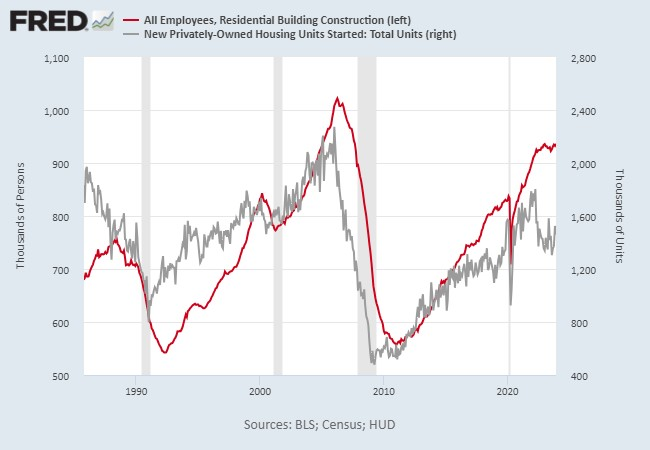The resilience of the US economy in 2023 was a surprise for some (several?) economists.
From the start of last year through the first half, and in some case into early Q3, an ample supply recession warnings flowed like wine from the lips of the punditocracy.
A careful reading of the data suggested otherwise, but high-risk warnings draw a crowd and so the dark forecasts endured and prospered, running well beyond their shelf life.
With the clarity of hindsight, the macro mea culpas are now in full swing. Ditto for efforts at reassessing recession models that were thought to be reliable but have subsequently proven shaky, or at least in need of a tune-up.
There are many flavors of the re-evaluation, ranging from analyzing why the so-called infallible inverted-yield-curve signal failed to the misleading recession signaling of the Leading Economic Index. To be fair, these and other widely followed recession indicators may yet prove accurate, but for the moment the US economic expansion rolls on.
An intriguing explanation for why many recession models failed last year: resiliency in residential construction payrolls. One veteran observer of all things housing yesterday explained that this data is effectively the “missing link” for why conventional recession models stumbled.
“I encourage everyone go back” and look at “the last three cycles” and “look at residential construction workers,” says Logan Mohtashami, the lead analyst for HousingWire. “If you’re trying to find the missing link to your recession model, traditionally speaking residential construction workers are falling down” during the start of recessionary conditions. But this time has been different, he reminds, or so it appears to date.
Indeed, sliding employment in the housing construction industry has been a useful recession predictor but has been conspicuously absent lately, as shown in the chart below. This is a bit surprising, given the weakness in housing starts.

How influential is housing for the business cycle? A research paper famously argued that “Housing IS the Business Cycle,” which aligns with Mohtashami’s analysis.
Minds will differ, of course. That includes the debate about the probability that a recession is near. The recessionistas (the macro equivalent of permabears) never admit defeat; instead, they routinely move the start date of the next recession forward, a clever strategy that ensures they’ll always be correct eventually.
Meanwhile, the housing-construction-worker factor, if correct, looks set to support the soft-landing forecasts in the near term.
Home builder sentiment rebounded sharply in January, suggesting that the housing activity may become a net plus for the economy this year after taking a beating in 2023. If so, the missing link for revising recession models may be (re)discovered anew by baffled business-cycle analysts in the months ahead.
